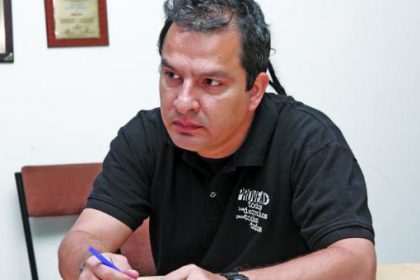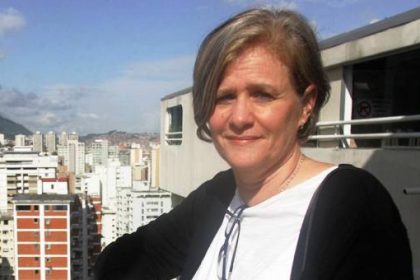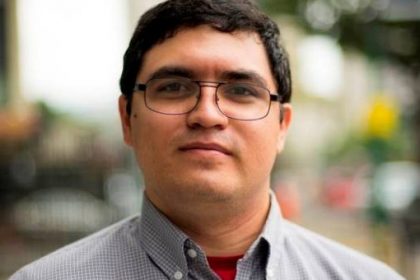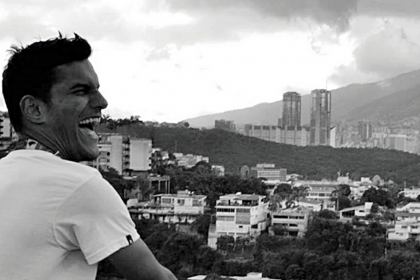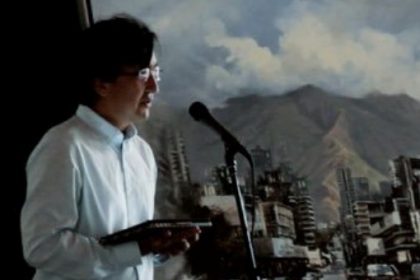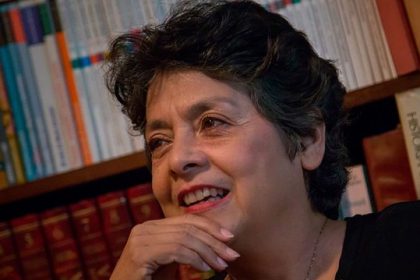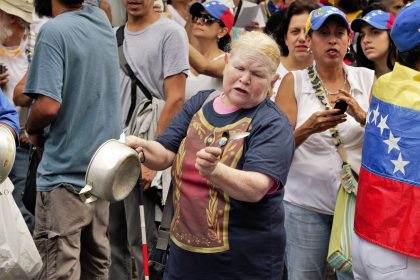By Luisa Ortega Díaz
2017 was a difficult year for all Venezuelans due to a number of unassertive political decisions in the country.
The progressive political, economic and social crisis, increased by the high levels of inflation and generalized scarcity of food and medicines presented a delicate scenario. This reality brought as a consequence that, in December 2015, the opposition resulted winner in the Parliamentary elections, assuming control of the National Assembly for the first time in 17 years.
Before handing the National Assembly, the former Members of the Parliament designed, arbitrarily and illegally, new magistrates of the Supreme Court of Justice through a clearly irregular procedure, which resulted in the disregards among the Executive, Legislative and Judiciary. This produced one of the most severe political and institutional crises in the country.
The aforementioned disregards begin in the end of 2015 and beginning of 2016, when the new magistrates withdrew the elected Members of the Parliament from Amazonas state. The objective was to avoid the qualified majority in the National Assembly. Facing the lack of response of the Supreme Court of Justice, approximately seven months later, the opposition Parliamentarians incorporated these Members. In that sense, the Supreme Court immediately responded, annulling the act and declaring the National Assembly in contempt.
Also, during 2016, the Electoral Power made the presidential recall referendum unfeasible and postponed the elections of governors that corresponded to December of that year, without specifying any date, which caused the governors to exercise de facto functions, even though some were discretionally appointed by the National Executive without popular election in Carabobo, Barinas, Sucre and Anzoategui states.
In January 2017 the opposition parties of the National Assembly declared the “abandonment of office” of President Nicolás Maduro, a measure of questioned legality that would only aggravate the crisis.
Two months later, through Sentences 155 and 156, the Supreme Court of Justice ignores the National Assembly and grants the Executive some of its powers.
That is how, on 31 March, in the exercise of my duties as Attorney General of the Republic, within the framework of the annual report of the Public Prosecutor’s presentation, I publicly denounced the unconstitutionality of such judgments, stating that they constituted a “break in the constitutional order.” A few days later, I challenged the appointment of the magistrates held in December 2015, which marked the beginning of countless systematic attacks against the Public Prosecutor’s Office.
In the month of April, protests and demonstrations arose that unleashed the most crude and perverse repression that has been recorded in our contemporary history.
The denial toward the reality of what the population suffers and the desire to stay in power at all costs, led the government to trample the Magna Carta, criminalise citizen protest and make the excessive use public force. The Judicial Power was used as an instrument of persecution in the service of the Executive and military power, taking the citizen as an “enemy.”
Likewise, the government-PSUV binomial disposed of all the communication media at the service of the State to incite the population to hatred against the unarmed demonstrators and to distort the facts that had been arousing, in order to turn them into insurrectional acts.
The criminal actions of the state security agencies and civilians armed by the government, under the direction of Nicolás Maduro and his military leadership, caused the death of over 131 Venezuelans and left thousands of wounded, detained and tortured. Cases that were duly documented through investigations.
During those difficult moments that the Republic went through, my team -consisting of directors, prosecutors and experts- focused on conducting impeccable and transparent investigations to establish the corresponding criminal responsibilities for the widespread and systematic violation of the Venezuelans’ human rights.
The population must know that we had a logistics of immediate action, which allowed prosecutors, forensic doctors, criminalists, researchers and other experts, to arrive to the locations of occurrence, once the facts violating human rights occurred.
This logistics and insistence of prosecutors in seeking independent investigations, attached to the truth, were torpedoed by the government structure, especially by the ministries of the People’s Power for Interior Relations, Justice and Peace, and Defense, from which they issued orders tending to prevent fiscal action.
After the participation of prosecutors of the Public Ministry’s Office, 2,049 injured persons were accredited, materializing the apprehension of 33 police and military officials, who were presented before the courts. However, the Judiciary, abducted by the government party, prevented the detention of others who were asked to arrest, in order to prevent the deliberate violation of human rights that was occurring in the country.
Thus, we find that, in at least 60% of these cases, the responsible agencies did not execute the arrest warrants or simply did not proceed with the delivery of the accused officials, which made the investigations difficult and reflected the lack of independence of the investigation justice bodies in Venezuela, which only await orders from the national executive and the intelligence agencies to act.
As part of the investigative will of the Public Prosecutor’s Office, over 1,600 investigative experts and proceedings were carried out, which contributed to reinforce and protect the criminal cases that subsequently sustained the complaint that we recorded on 16 November 2017 before The Hague’s International Criminal Court against Nicolás Maduro, Vladimir Padrino López, Néstor Reverol, Gustavo González López and Antonio Benavides Torres for the perpetration of crimes against humanity.
It is important to highlight that, in many of these cases, the National Executive functioned irresponsibly as judge and investigator, questioning the work of prosecutors, only to divert attention from public opinion and distort what the laws and science actually dictate to do justice.
Such was the case of Juan Pablo Pernalete, from which I reported details on 24 May 2017. We verified scientifically, after the Criminalistics Unit of the Public Ministry’s Office practiced over 90 studies, that this young Venezuelan athlete died after being hit with a tear gas bomb, fired by the National Guard (GN, acronym in Spanish), a fact that the National Government tried to deny by pointing out without evidence that a captive bolt would have been the cause of the death of the young protester, in order to cover the military officer.
The case of Orlando José Figuera, a 22-year-old young man who was beaten and burned by several people on 20 May 2017, in a protest scene in the Altamira urbanization of Chacao municipality, Miranda state, was able to verify that Figuera had a dispute with a man who stabbed him and made the other protesters believe that he was stealing so that they attacked him, and not that he was attacked for being a sympathizer of the regime as Nicolás Maduro asserted, who ruthlessly manipulated the Venezuelan’s tragic death.
Carrying out all these transparent and scientific investigations, Maduro ordered the Minister of Defense and police directors that those arrested during the protests were not placed at the order of the Public Ministry, but submitted to military justice, which violated the principle of natural judge that enshrines the Constitution of the Bolivarian Republic of Venezuela, argument that sustained our complaint before the ICC.
There were violations of human rights to the civilian population in a systematic manner, excessive repressions that tried to stifle the will and courage of the demonstrators who only exercised their right to demand dignified living conditions.
In addition, prosecutors were able to determine other irregularities in the detention of demonstrators by police and military officials, since in many cases the police report did not explain in detail the circumstances of the way, time and place in which he was apprehended committing the crime, therefore it had to be requested the full freedom of the people, in strict compliance with the Constitution, laws and due process.
An example of this is what happened in Nueva Esparta at that time, where 38 citizens were apprehended by the National Guard (GN), who once handed over to the Corps of Scientific and Criminal Investigations, were unaware of the reasons why they were arrested. The Public Ministry requested the nullity of this decision for lack of sustenance, but at that time the court kept them illegally, a practice that later became generalized throughout the country.
All those actions in favor of the right to justice unleashed the wrath of the Government. Therefore, the illegal and fraudulent National Constituent Assembly (ANC), installed on 30 July 2017, had as its first action the dismantling of the Public Ministry. Its priority was not to attack hunger or the shortage of medicines, among other problems that triggered the wave of protests, but to seize the only institution that stood firm, guaranteeing respect for the Constitution.
This task is set on 31 March 2017, when I reported to the media that sentences 155 and 156 of the Supreme Court of Justice evidenced a breach of the constitutional order that ended my illegal removal from office on 5 August of that same year, by means of a vitiated preliminary hearing of the Supreme Court.
I have always maintained that we should not endorse violence as a weapon of political action, because politics should not lead us to war. Politics is the exercise of negotiation and, in a democratic country, the confrontation of ideas within the framework of differences, guided by the Constitution.
However, peace is not decreed, it is built with strong institutions that guarantee the exercise of the rights of all Venezuelans, without any type of political discrimination.
Our Venezuela has fallen into an abysm due to the pettiness, corruption and ignorance of an irresponsible ruling sector that has already proven to be inefficient. It is urgent to organize the citizenship among all to rebuild the Republic. In this way, we will be able to create a public and private structure that guarantees the welfare of the citizens through work and education. Once we get out of this nightmare, our duty as a society is to raise awareness about what we suffer today, in order to avoid an irresponsible and incapable government like Nicolás Maduro’s to once again lead the country’s destiny.
—


